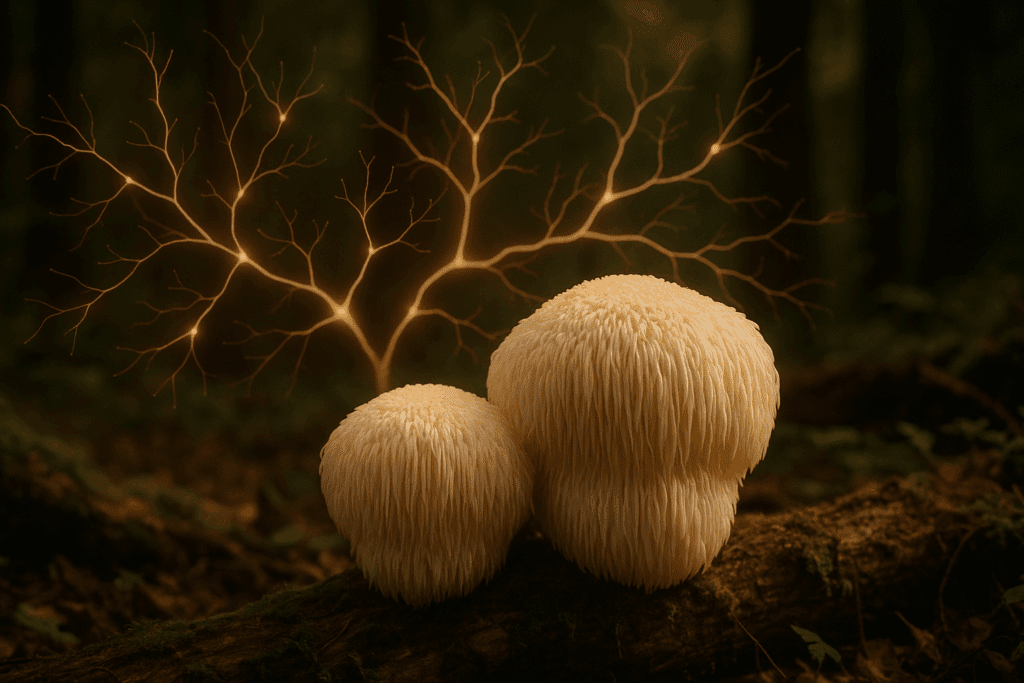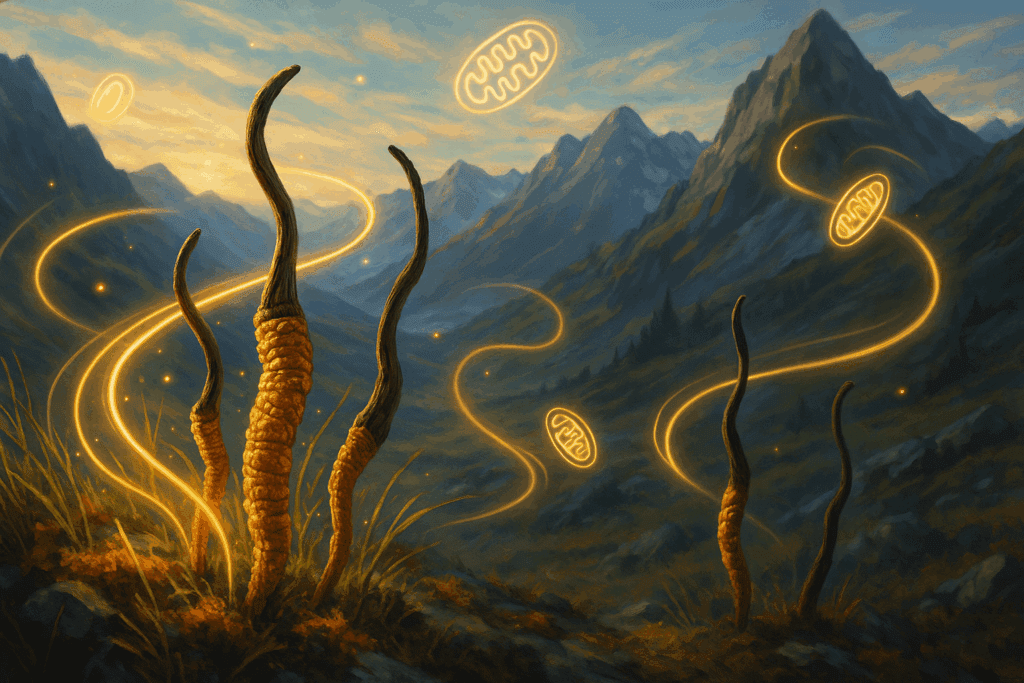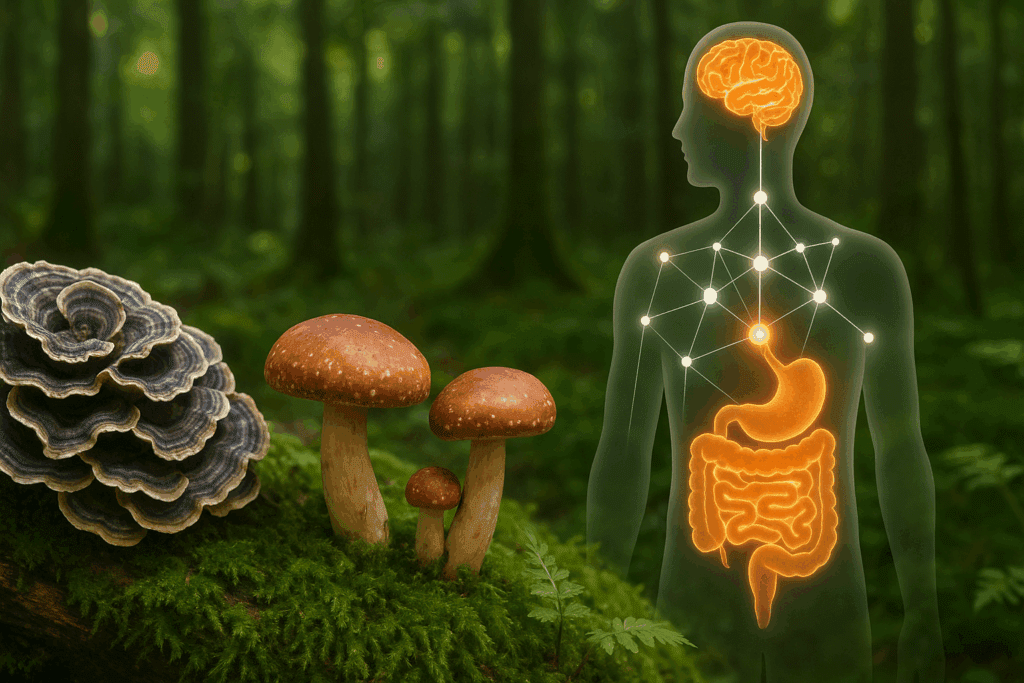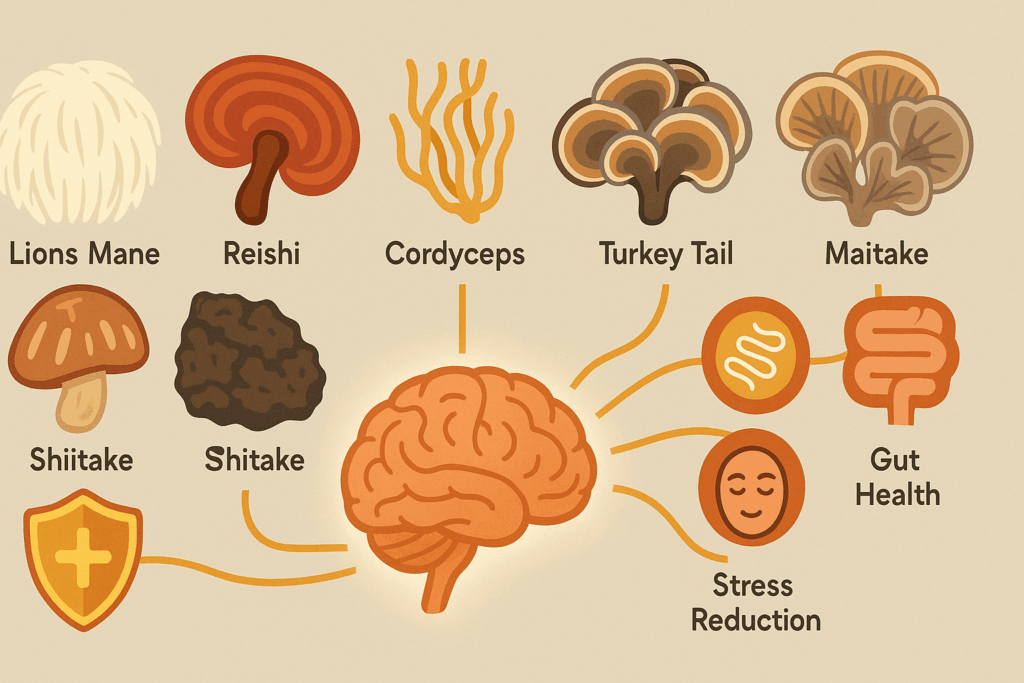Unlocking the Brain’s Potential with Nature’s Smartest Fungi
In the realm of natural health enhancers, nootropic mushrooms are increasingly gaining the spotlight for their impressive effects on cognitive performance, memory, and mental clarity. These powerful fungi, often referred to as “smart mushrooms,” contain bioactive compounds that work synergistically with the brain to elevate function, reduce stress, and promote long-term neurological health. Among these, the concept of mushroom 7 benefits has emerged as a compelling point of discussion, particularly in relation to cognitive enhancement. This phrase encapsulates the benefits associated with seven of the most well-known nootropic mushroom species: Lion’s Mane, Reishi, Cordyceps, Chaga, Shiitake, Turkey Tail, and Maitake. Each of these mushrooms brings a unique set of neuroprotective, adaptogenic, and antioxidant properties that collectively support brain health in a holistic manner.
The 7 mushroom blend benefits go far beyond mere supplementation trends. Scientific research continues to validate the brain-boosting potential of these fungi, showing how their active compounds such as hericenones, erinacines, beta-glucans, and polysaccharides interact with neural pathways to improve cognitive outcomes. This article will explore how these seven mushrooms exert their effects, delve into the biochemistry behind their nootropic capabilities, and offer practical insights for integrating them into your wellness routine. As we journey through the mushroom 7 benefits, you’ll gain a deeper appreciation for the intersection of ancient wisdom and modern neuroscience that makes these fungi a true marvel of nature.
You may also like: The Ultimate Guide to the Best Nootropic Mushrooms for Memory and Cognitive Enhancement

Enhancing Neurogenesis: Lion’s Mane and Cognitive Regeneration
Among the mushroom 7 benefits, Lion’s Mane (Hericium erinaceus) is perhaps the most celebrated for its direct impact on neurogenesis, the process by which new neurons are formed in the brain. This mushroom contains unique compounds known as hericenones and erinacines, which have been shown to stimulate the production of Nerve Growth Factor (NGF). NGF is essential for the growth, maintenance, and survival of neurons, playing a critical role in learning, memory, and cognitive resilience.
Numerous studies have demonstrated that regular supplementation with Lion’s Mane can improve cognitive performance, particularly in individuals experiencing mild cognitive impairment. This is significant not only for aging populations but also for younger adults looking to maintain peak mental performance. Furthermore, Lion’s Mane exhibits antioxidant and anti-inflammatory properties, which are vital for protecting brain cells from oxidative stress and inflammation—two key contributors to neurodegenerative diseases such as Alzheimer’s and Parkinson’s.
What sets Lion’s Mane apart is its dual role in both protecting existing neurons and promoting the formation of new ones. This regenerative capacity makes it a unique player in the field of cognitive enhancement. For college students, professionals, and older adults alike, incorporating Lion’s Mane into a daily regimen may offer a natural and effective way to support brain health, boost memory retention, and enhance mental clarity over time.

Managing Stress and Promoting Balance: The Adaptogenic Power of Reishi
Another pillar of the mushroom 7 benefits is Reishi (Ganoderma lucidum), often referred to as the “mushroom of immortality” in traditional Chinese medicine. Reishi is best known for its adaptogenic properties—that is, its ability to help the body adapt to stress, restore balance, and maintain homeostasis. In the context of cognitive health, stress management is crucial, as chronic stress has been linked to impairments in memory, concentration, and emotional regulation.
Reishi contains a variety of bioactive compounds, including triterpenoids and polysaccharides, which exert calming effects on the nervous system. These compounds help modulate the hypothalamic-pituitary-adrenal (HPA) axis, the central stress response system. By reducing cortisol levels and enhancing resilience to stress, Reishi contributes to improved mood, better sleep, and more stable cognitive performance under pressure.
Additionally, Reishi’s immunomodulatory properties offer indirect support to brain health. A well-functioning immune system is essential for preventing neuroinflammation, which can negatively impact cognition. By promoting immune balance and reducing systemic inflammation, Reishi adds a valuable dimension to the nootropic effects of the 7 mushroom blend benefits.
Integrating Reishi into one’s daily routine can thus be a strategic move for those seeking to cultivate a calm, focused, and resilient mind. Whether consumed as a tea, tincture, or capsule, Reishi works best when taken consistently over time, allowing its cumulative effects to unfold gradually and profoundly.

Energizing the Mind and Body: Cordyceps and Mitochondrial Support
Cordyceps (Cordyceps militaris and Cordyceps sinensis) brings a distinct vitality to the mushroom 7 benefits by enhancing cellular energy production and physical stamina. While commonly associated with athletic performance, Cordyceps also plays a crucial role in supporting mental energy, focus, and overall cognitive endurance.
The primary mechanism behind Cordyceps’ energizing effects lies in its ability to increase adenosine triphosphate (ATP) production within the mitochondria—the energy powerhouses of cells. More ATP means more fuel for neurons, which translates to enhanced mental alertness, quicker information processing, and reduced mental fatigue. This is especially beneficial for individuals facing demanding cognitive workloads or experiencing brain fog.
Cordyceps also improves oxygen utilization and supports cardiovascular health, both of which contribute to a steady supply of oxygen and nutrients to the brain. Its anti-inflammatory and antioxidant properties further shield neural tissues from damage, ensuring long-term cognitive vitality. Unlike stimulants that can cause jitters or crashes, Cordyceps offers a smooth and sustained boost, making it an ideal supplement for those seeking natural energy without the downsides of caffeine.
For those navigating busy schedules or intensive academic environments, Cordyceps can be a powerful ally. It not only sustains physical and mental energy throughout the day but also promotes recovery and resilience, laying the foundation for consistent cognitive performance.

Protecting the Brain from Oxidative Damage: The Antioxidant Shield of Chaga
Chaga (Inonotus obliquus) is a fungus that thrives in cold climates and grows primarily on birch trees. Renowned for its extraordinary antioxidant content, Chaga offers critical neuroprotective benefits that form a core part of the mushroom 7 benefits. Oxidative stress, which results from an imbalance between free radicals and antioxidants, is a major driver of cognitive decline and neurodegenerative diseases.
Chaga contains a rich blend of polyphenols, melanin, and superoxide dismutase (SOD), all of which contribute to its potent antioxidant profile. These compounds work together to neutralize free radicals, protect neural tissues, and support cellular integrity. By mitigating oxidative damage, Chaga helps maintain the structural and functional health of the brain over time.
In addition to its antioxidant effects, Chaga supports immune function and exhibits anti-inflammatory properties that further contribute to cognitive well-being. Its polysaccharides help modulate immune responses, preventing excessive inflammation that can harm brain cells. For individuals exposed to environmental toxins, high stress, or dietary imbalances, Chaga provides a robust defense system that safeguards brain function.
Incorporating Chaga into a wellness routine can be as simple as adding it to coffee, tea, or smoothies. Its earthy flavor pairs well with a variety of beverages, making it a practical and enjoyable way to access one of the most vital aspects of the 7 mushroom blend benefits.
Strengthening Memory and Focus: Mushroom 7 Benefits for Cognitive Performance
Memory enhancement is one of the most compelling reasons people turn to nootropic mushrooms. Within the framework of mushroom 7 benefits, several fungi—notably Lion’s Mane, Reishi, and Cordyceps—contribute to improved recall, attention span, and executive function. These mushrooms support various aspects of memory by promoting neuroplasticity, reducing inflammation, and improving neurotransmitter balance.
Lion’s Mane stimulates neurogenesis, helping to form new synaptic connections that are essential for learning and memory consolidation. Reishi, by calming the nervous system, creates an optimal mental state for focused learning and recall. Cordyceps, through enhanced mitochondrial function, ensures that brain cells have the energy required for complex cognitive tasks. Together, these mushrooms create a multi-pronged strategy for sharpening the mind and maintaining mental agility.
Research in animal models and preliminary human studies supports these effects. For example, supplementation with Lion’s Mane has been shown to improve recognition memory and spatial learning in older adults. Meanwhile, Reishi has demonstrated anxiolytic and antidepressant-like effects, which are closely tied to improved cognitive function under stress.
The combination of these mushrooms into a 7 mushroom blend magnifies their individual effects, creating a synergistic network of support for the brain. The mushroom 7 benefits thus extend far beyond short-term enhancement, offering a sustainable path to cognitive longevity and intellectual vitality.

Immune and Gut-Brain Axis Support: Turkey Tail and Shiitake in the Nootropic Equation
While often overlooked in the nootropic space, Turkey Tail (Trametes versicolor) and Shiitake (Lentinula edodes) play crucial roles in supporting the gut-brain axis—a bidirectional communication system between the gastrointestinal tract and the central nervous system. As emerging research continues to uncover the profound influence of gut health on cognitive function, these mushrooms have earned a rightful place within the mushroom 7 benefits.
Turkey Tail is rich in polysaccharopeptides like PSK and PSP, which enhance gut immunity and modulate the microbiota. A balanced and diverse microbiome is essential for optimal neurotransmitter production, particularly serotonin and dopamine, which regulate mood and cognition. By fostering a healthy gut environment, Turkey Tail indirectly supports mental clarity, emotional balance, and cognitive flexibility.
Shiitake mushrooms contribute to brain health through their high content of B vitamins, including B6 and folate, which are critical for neurotransmitter synthesis. They also contain ergothioneine, a rare amino acid with antioxidant properties that protect brain tissues from oxidative and inflammatory damage. The dual action of nutrient support and immune modulation makes Shiitake a valuable ally in the pursuit of cognitive well-being.
Incorporating these mushrooms into one’s diet or supplement stack not only enhances immune defense but also nurtures the gut-brain connection—a fundamental, yet often underappreciated, pillar of cognitive health. Their inclusion in the 7 mushroom blend benefits ensures a comprehensive, inside-out approach to mental performance and resilience.
Mushroom 7 Benefits and Long-Term Brain Health: A Preventative Perspective
As we age, maintaining cognitive function becomes an increasingly important aspect of overall wellness. The mushroom 7 benefits offer a proactive approach to preserving brain health and delaying age-related cognitive decline. This preventative potential is rooted in the cumulative effects of neuroprotection, neurogenesis, energy optimization, and immune support provided by the seven mushrooms.
Chronic neuroinflammation, oxidative stress, and mitochondrial dysfunction are key contributors to cognitive aging and neurodegenerative disorders. The antioxidant-rich Chaga, the neurogenic Lion’s Mane, and the mitochondrial-boosting Cordyceps collectively counteract these mechanisms. Meanwhile, the adaptogenic and immunomodulatory effects of Reishi, Shiitake, and Turkey Tail enhance resilience to environmental stressors and systemic inflammation.
By targeting multiple biological pathways involved in cognitive decline, the 7 mushroom blend benefits establish a foundation for long-term neurological integrity. Unlike pharmaceutical interventions that often address symptoms, these mushrooms work at the root level to promote healing, balance, and functional optimization.
Moreover, the accessibility and safety profile of these fungi make them suitable for a broad demographic, from young adults seeking cognitive enhancement to older individuals focused on cognitive preservation. When used as part of a consistent, integrative wellness plan, nootropic mushrooms offer a natural and sustainable path toward lifelong brain health.

Integrating Mushroom 7 Benefits into a Daily Wellness Routine
Incorporating nootropic mushrooms into your lifestyle does not require drastic changes or expensive regimens. Thanks to the growing popularity of functional mushroom products, a wide array of supplements, powders, tinctures, and even ready-to-drink beverages are now available. The key is to choose high-quality, organic, and clinically standardized formulations that combine the seven mushrooms in efficacious ratios.
A common and convenient way to consume the 7 mushroom blend is through daily capsules or powder blends that can be added to coffee, smoothies, or tea. Many users report enhanced focus, reduced anxiety, and improved memory within weeks of consistent use. However, it is important to remember that the benefits of these mushrooms are cumulative, not instantaneous. Regular use over time, combined with a balanced diet, physical activity, and stress management, will yield the most profound results.
When selecting products, look for transparency in sourcing, third-party testing, and the use of fruiting body extracts rather than mycelium grown on grain. These factors significantly impact the bioavailability and potency of the active compounds. Consulting with a healthcare professional is also advisable, especially for individuals with underlying health conditions or those taking medication.
Embracing the mushroom 7 benefits as part of a holistic approach to brain health represents an investment in both present and future cognitive vitality. With mindful integration and consistent use, these remarkable fungi can become foundational allies in your journey toward optimal mental performance and well-being.
Exploring Future Research on Mushroom 7 Benefits and Cognitive Science
As the popularity of nootropic mushrooms continues to surge, so too does scientific curiosity surrounding their mechanisms and applications. One of the most promising aspects of mushroom 7 benefits lies in their potential to influence brain plasticity, resilience, and even recovery from injury. However, despite a growing body of preclinical and human studies, many questions remain unanswered. Future research will need to focus on randomized, double-blind clinical trials that explore both short-term cognitive enhancement and long-term neuroprotective outcomes in diverse populations.
For example, while we know that Lion’s Mane stimulates NGF production, researchers are still exploring how this translates into structural changes in the human brain. Advanced imaging technologies such as functional MRI (fMRI) and positron emission tomography (PET) may offer new insights into how nootropic mushrooms alter brain function over time. Similarly, the anti-inflammatory and antioxidant effects observed in animal models need to be validated in larger, more diverse human cohorts to fully understand the implications for aging, neurodegenerative diseases, and mood disorders.
In addition, there is increasing interest in how the 7 mushroom blend benefits may be enhanced through synergistic interactions not just between mushrooms, but also with other natural nootropics like bacopa monnieri, ginkgo biloba, and L-theanine. Systems biology and network pharmacology approaches can provide a deeper understanding of how multiple compounds interact across the brain’s complex signaling networks. These interdisciplinary studies hold promise for developing more refined, personalized supplementation protocols that cater to individual cognitive needs and genetic profiles.

Cultural and Historical Contexts of Mushroom Use in Brain Health
It’s important to acknowledge that the use of nootropic mushrooms is not a recent innovation, but rather a revival of ancient wisdom validated by modern science. Indigenous cultures around the world have long revered mushrooms for their healing, spiritual, and cognitive benefits. For instance, Lion’s Mane was traditionally used by Buddhist monks to enhance focus during meditation, while Reishi was a staple in Taoist herbalism for promoting mental tranquility and spiritual balance.
In Japan and China, mushrooms like Shiitake and Maitake were consumed not just for their immune-enhancing properties, but also for their perceived ability to invigorate the mind and body. The use of Chaga in Siberian and Nordic cultures dates back centuries, where it was brewed into teas believed to enhance vitality and cognitive clarity during long winters. These cultural narratives reflect a deep, intuitive understanding of the mushroom 7 benefits long before they were described in the language of biochemistry and clinical trials.
Recognizing these historical contexts enriches our appreciation for the multifaceted roles mushrooms have played in human cognitive evolution. It also encourages a more integrative approach to wellness—one that honors traditional knowledge systems alongside empirical scientific research. As the global health community increasingly turns to nature for answers to modern ailments, the enduring legacy of medicinal mushrooms offers both guidance and inspiration for future innovations in brain health.
Frequently Asked Questions About Mushroom 7 Benefits
1. What makes the mushroom 7 benefits unique compared to single-mushroom supplements?
The uniqueness of mushroom 7 benefits lies in the synergy created by combining seven distinct fungi, each with its own specialized role in cognitive enhancement. Unlike single-mushroom supplements, which may only target one area of brain health, a 7 mushroom blend benefits the user by addressing multiple systems at once, including neuroprotection, mitochondrial function, immune regulation, and stress modulation. This multi-targeted strategy makes the formulation more versatile and potentially more effective for a broader range of cognitive challenges. Users often report more balanced and sustained improvements in memory, focus, and mood when using a full-spectrum blend. Additionally, emerging research suggests that certain bioactive compounds may be more bioavailable or efficacious when taken in combination rather than isolation.
2. Are there any potential interactions between nootropic mushrooms and prescription medications?
Yes, although generally well-tolerated, nootropic mushrooms can interact with certain medications, particularly those that affect the immune system, blood pressure, or blood sugar levels. For example, Reishi and Maitake may enhance the effects of antihypertensive drugs or insulin, potentially leading to hypotension or hypoglycemia. Individuals on anticoagulants should also be cautious, as mushrooms like Shiitake can have mild blood-thinning effects. It is always advisable to consult with a healthcare professional before starting any new supplement, especially if you are managing chronic conditions or taking medication. Personalized guidance ensures safe integration and helps maximize the benefits of a mushroom 7 blend.
3. How do the 7 mushroom blend benefits influence mental stamina in high-stress professions?
The 7 mushroom blend benefits professionals in high-demand roles such as healthcare, education, and tech by supporting sustained cognitive output and emotional resilience. Cordyceps enhances cellular energy, which helps maintain focus and alertness during extended work hours. Reishi and Lion’s Mane, on the other hand, reduce mental fatigue by calming the nervous system and enhancing neurogenesis. The adaptogenic properties of these mushrooms equip the brain to handle continuous stress without succumbing to burnout. Over time, users often experience better decision-making under pressure and improved emotional regulation, which are crucial for high-stakes environments.
4. Can children or adolescents safely take supplements that offer mushroom 7 benefits?
While nootropic mushrooms are generally safe for adults, their use in children and adolescents should be approached with caution. The brain during early development is highly sensitive, and introducing bioactive compounds may have unpredictable effects. Most clinical studies have been conducted on adults, and there is limited data regarding safety, dosage, and efficacy in younger populations. That said, some practitioners may recommend low-dose formulas of certain mushrooms like Lion’s Mane for neurodevelopmental support under medical supervision. Until more research is available, it is best to reserve mushroom 7 blends for adult users unless otherwise directed by a pediatric health expert.
5. What role do mushroom 7 benefits play in supporting creative cognition and innovation?
Creativity is a multidimensional cognitive function that relies on memory, focus, emotional regulation, and divergent thinking. Mushroom 7 benefits support these faculties by optimizing the neurochemical and structural conditions needed for creative output. Lion’s Mane enhances neural connectivity and neuroplasticity, which are foundational for novel idea generation. Reishi and Turkey Tail stabilize mood, helping users access flow states with greater ease. Additionally, Cordyceps provides the physical stamina needed to sustain long brainstorming sessions or creative tasks. Artists, designers, and innovators may find that a consistent routine with a 7 mushroom blend fosters deeper engagement and more prolific output.
6. How do the 7 mushroom blend benefits support brain recovery after illness or trauma?
Recovery from brain-related illnesses or traumatic events often involves reducing inflammation, repairing neural networks, and restoring neurotransmitter balance. The mushroom 7 benefits contribute to these processes in meaningful ways. Chaga and Shiitake offer potent antioxidant protection that helps reverse oxidative damage from illness. Lion’s Mane stimulates regrowth of damaged neurons, supporting the restoration of cognitive function. Reishi modulates immune responses, making it valuable for managing post-infection fatigue or brain fog. Together, these mushrooms form a comprehensive recovery protocol that may complement physical therapy and other rehabilitation efforts.
7. Are there optimal times of day to take a 7 mushroom blend for maximum cognitive benefit?
Timing can influence how effectively your body responds to nootropic mushrooms. For instance, Cordyceps and Lion’s Mane are typically best taken in the morning or early afternoon because they promote energy, alertness, and focus. Reishi, on the other hand, has calming effects and is often recommended for evening use to support relaxation and restorative sleep. Some products offer dual-formula systems with separate day and night capsules to align with circadian rhythms. Following a consistent schedule that matches the mushrooms’ natural effects can enhance the long-term outcomes of mushroom 7 benefits.
8. How do environmental and dietary factors influence the efficacy of mushroom 7 benefits?
The body’s internal environment significantly affects how well it can absorb and utilize the bioactive compounds in mushrooms. A diet rich in healthy fats, fiber, and antioxidants can enhance the efficacy of the 7 mushroom blend benefits by supporting gut health and nutrient absorption. Environmental stressors such as pollution, lack of sleep, and chronic stress can counteract the mushrooms’ benefits, making lifestyle alignment essential. Hydration and regular physical activity also contribute to optimal brain function and synergize with the effects of nootropic fungi. Adopting a holistic health approach ensures that the benefits of supplementation are fully realized and sustained over time.
9. Can mushroom 7 benefits be customized for specific cognitive goals, such as memory vs. focus?
Yes, with the right formulation or dosing strategy, the mushroom 7 benefits can be tailored to meet specific cognitive needs. For enhanced memory, a higher concentration of Lion’s Mane may be emphasized. For focus and stamina, Cordyceps and Chaga take precedence. Those seeking emotional balance or improved sleep might benefit from a blend richer in Reishi and Turkey Tail. Some advanced formulations even offer modular dosing kits that allow users to adjust proportions based on evolving goals or stress levels. This adaptability is one reason why the 7 mushroom blend benefits are increasingly popular among biohackers and wellness enthusiasts.
10. What innovations are emerging in the development of mushroom-based cognitive enhancers?
The future of nootropic mushroom supplements is moving toward precision medicine and nanotechnology. Innovations include nanoparticle delivery systems that increase the bioavailability of mushroom compounds, making the effects more immediate and potent. AI-driven health platforms are beginning to offer personalized mushroom blend recommendations based on genetic markers, lifestyle inputs, and cognitive performance metrics. There is also growing interest in combining mushroom 7 benefits with other adaptogens, vitamins, and nootropics to create hybrid cognitive enhancement systems. As scientific validation and consumer demand continue to grow, we can expect increasingly sophisticated, personalized, and effective mushroom-based interventions in the near future.
Conclusion: Harnessing the Full Power of the 7 Mushroom Blend for Cognitive Excellence
In the ever-expanding world of natural nootropics, few solutions offer the breadth, depth, and scientific credibility of the 7 mushroom blend. The mushroom 7 benefits represent a convergence of ancient wisdom and cutting-edge neuroscience, delivering a holistic strategy for enhancing memory, focus, energy, and long-term brain health. From the neurogenic prowess of Lion’s Mane to the immune-balancing effects of Turkey Tail, each mushroom plays a synergistic role in supporting a resilient and high-performing mind.
What makes this blend truly remarkable is its capacity to address cognitive health from multiple angles: stimulating neurogenesis, shielding neurons from oxidative damage, optimizing mitochondrial energy, managing stress, and nurturing the gut-brain axis. By integrating these fungi into your daily wellness routine, you are not merely supplementing your diet—you are actively participating in a preventative, restorative, and performance-oriented approach to mental health.
The road to cognitive excellence is not paved with shortcuts or miracle cures, but with consistent, science-backed strategies that respect the complexity of the human brain. In this light, the mushroom 7 benefits offer a compelling, trustworthy, and effective pathway for anyone seeking to safeguard their cognitive function, improve mental clarity, and thrive in the face of life’s intellectual demands. Embrace the power of nootropic mushrooms and experience the transformative potential they hold for your mind and your future.
Further Reading :
7 Mushrooms and their Benefits
7 Impressive Reasons To Eat Mushrooms
Functional Mushrooms: 7 Kinds and Their Unique Health Benefits
